

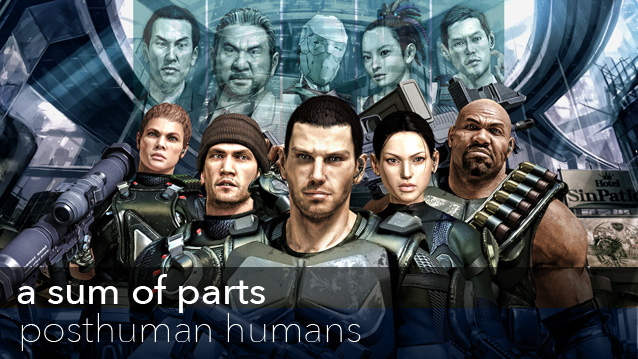
“I would like to suggest that human is a constructed (and often contested) identity or subject position, rather than a fixed, natural state of being. It is social, historical, political, contextual, fluid, and often technologically mediated, and it has much to do with both power and its distribution” - Monica Casper, “Reframing and Grounding Nonhuman Agency”
Warning: this week’s articles contains spoilers for Binary Domain and a dash of cyborg feminist theory.
Last week I wrote about what Binary Domain says about discrimination, showing how the Hollow Children are subjugated as inhuman, just as many minority identities have been before them. In this world, either you are human or you are other. Throughout history we have constructed binaries of identities, of either/or scenarios where you are ‘in’ or you are ‘out’. I concluded that article saying that rather than forcing individuals into either/or categories, the category of ‘human’ has to embrace the multitudes offered by ‘and’.
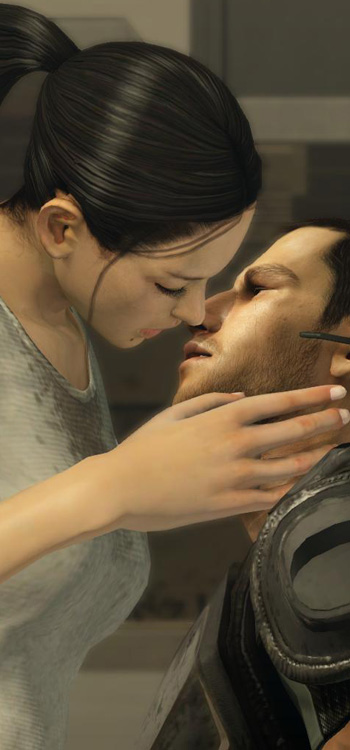 But of course, as the later parts of Binary Domain demonstrate, humans are not very good at ‘and’. We thrive on binaries. We look at the world and our brains instantly categorise things into distinct groups: man/woman, adult/child, nature/culture, country/city, human/robot. When something doesn’t fit easily into one of these seemingly distinct categories, (say, a transgendered person, for instance), it bothers people. We need to fit things into binaries, and we struggle to accept anything or anyone that transgresses those binaries. We do this to the extent that we create another binary all together for things that don’t fit into either category: normal/not-normal.
But of course, as the later parts of Binary Domain demonstrate, humans are not very good at ‘and’. We thrive on binaries. We look at the world and our brains instantly categorise things into distinct groups: man/woman, adult/child, nature/culture, country/city, human/robot. When something doesn’t fit easily into one of these seemingly distinct categories, (say, a transgendered person, for instance), it bothers people. We need to fit things into binaries, and we struggle to accept anything or anyone that transgresses those binaries. We do this to the extent that we create another binary all together for things that don’t fit into either category: normal/not-normal.
More than simply demonstrating discrimination against othered groups, Binary Domain works to actively expose and eschew the very notion binary categorisation. It works to show how we instinctively try to put things in groups, and how a truly inclusive and progressive society would consciously work past this to allow a more fluid, malleable, and contextual idea of what is ‘human’. One focused on inclusivity, not exclusivity.
The game does this by playing on our expectations. From the moment that we first hear about the existence of Hollow Children, we expect the inevitable reveal that one of the members of the Rust Team is, in fact, a Hollow Child. It’s inevitable, surely. Take a group of humans, get them all to feel attached to each other, then reveal one of them as a robot to show the true ‘humanity’ of Hollow Children, right?
But Binary Domain knows that we are expecting this. It knows that we expect our Rust Crew members to be either human or Hollow Child, and it plays with this. Instead, we find out that Faye’s mother was a Hollow Child. Faye herself is completely organic, but one of her parents was a robot. Faye is completely organic and a hollow child. She is, as the game classifies her, a “hybrid person”. Here, at last, the binary of human and nonhuman utterly collapses in on itself, taking with them Dan’s own black-and-white ideological hatred of ‘scrapheads’.
At this point of the game, Dan is in love with Faye. The other members of the Rust Crew, however, straight away decide that she must be killed. “Faye being alive isn’t the matter here,” says Bo, implying that Faye never was alive in the first place. Instantly, their empathy for her has switched off. She has to die. Dan insists that she is human because there are “no mechanical traces” in her. Charles, though, simply claims “Exactly. That just makes her more dangerous.”
Earlier, when we saw the robot man kill himself, it was because he had a metallic skeleton that his existence could not be tolerated. But now Faye is completely, 100% flesh. But she still doesn’t fit within the accepted understanding of human. Now it is her heritage, her lineage that denies her access to the label of ‘human’, that instead classifies her as an outsider. What this reveals, beautifully, is that, really, it was never what the Hollow Children were materially made from that mattered, but something much deeper. It’s what they represent, who they are, who their parents are, what they stand for. It was always about how their very existence and identities challenge the seemingly stable borders of our current notion of ‘human’. So used to determining something as either human or not, new entities that don’t fit easily in either camp frighten us. They destabilise how we understand the world. They threaten our understanding of ourselves.
Determining who is and is not human is a play of power, of determining who gets to be in charge, and who gets to be dominated. Of course, this is something feminist theorists have been talking about for decades. Theorists such as Judith Butler, Donna Haraway, and N Katherine Hayles and countless others have used the increasingly intimate relationship between humans and their technologies to demonstrate just how stable notions of ‘human’ are used to oppress and marginalise those that don’t count as ‘normal’ for whatever reason. In turn, such theorists instead call for conceptualisations such as the posthuman. The idea of the posthuman is to start from the ground up. To start with the multitude of partial and contradictory identities to come to a continuously reconstructed notion of what humanity is, rather than starting with stable notions and measuring individuals as either accepted or found wanting.
 The idea of posthumanism doesn’t hail the end of humanity so much as the end of ‘human’ as a prescriptive, stable category that entities can be easily measured against and excluded from. It hails the end of a category that, throughout history, has excluded non-white people, homosexual people, female people, and all other kinds of identities. Posthumanism, instead, holds that we are each made up of an amalgam of partial and contested identities, none more universal than any of the others, and it is the amalgam of all these identities that builds up the mixed, varied, assorted kinds of beings that exist as ‘humans’.
The idea of posthumanism doesn’t hail the end of humanity so much as the end of ‘human’ as a prescriptive, stable category that entities can be easily measured against and excluded from. It hails the end of a category that, throughout history, has excluded non-white people, homosexual people, female people, and all other kinds of identities. Posthumanism, instead, holds that we are each made up of an amalgam of partial and contested identities, none more universal than any of the others, and it is the amalgam of all these identities that builds up the mixed, varied, assorted kinds of beings that exist as ‘humans’.
In Binary Domain, the existence of Faye and the other hybrid people demonstrate just how unsuitable a stable notion of ‘human’ is to account for all the ways different people identify themselves as humans. What it means to be human increasingly means a wider array of different things. In Binary Domain, as a new generation is born to both human and nonhuman parents, the need for malleable and manipulable definitions of human is urgently needed.
But the powers that be refuse to accept this. A new, inclusive conception of ‘human’ would threaten their power. So instead of accepting this new notion of what it means to be human, they determine that all the hybrid people must die. As the game ends, hit squads are sent around the world to destroy these hybrid people, these fully organic people living out their lives in peace. All because the sanctity of ‘human’ must be upheld. The status quo must not be challenged. Those in power must be allowed to keep their power. The same has happened throughout history and is happening right now: straight people determine whether or not non-straight people get equal rights over their love lives. Governments and churches dominated by men to determine whether or not women have equal rights over their own bodies. Those privileged, powerful few with the most security and stability in the accepted notion of ‘human’ have the most to lose in a broader, more inclusive notion of the ‘posthuman’ and they will—and do—fight to keep their power.
In our own world, we are all increasingly becoming cyborg hybrid people for hours at a time in front of our computers, Even when we aren’t sitting in front of machines, we find ourselves taking on more and more identities in our daily lives without any one of them having to be all-defining of who we are. As this continues, as society (hopefully) progresses to become more and more inclusive of a broader and broader range of people and identities, we need notions of humanity that can account for all of us as hybrid people. ‘Human’ as a stable category has only ever benefitted those few in society with the most power, those with the most control. To be truly inclusive, society needs to understand hybrid people like Faye—hybrid people like us—as posthuman.
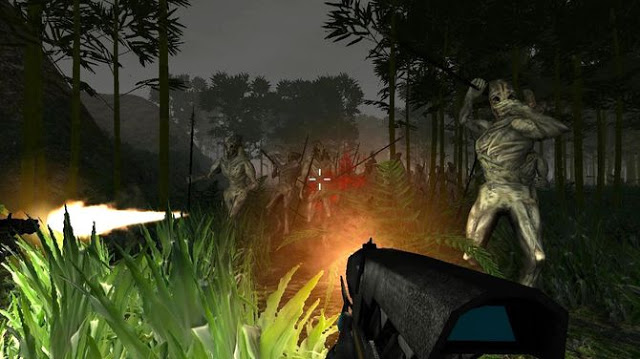

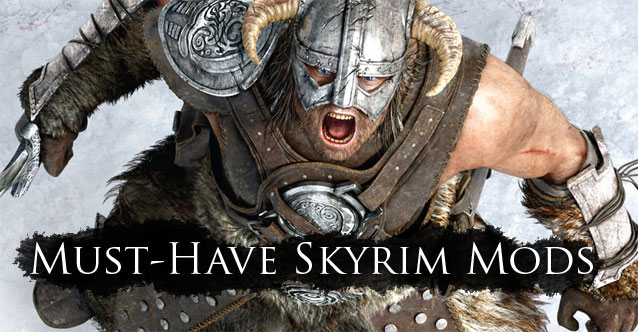
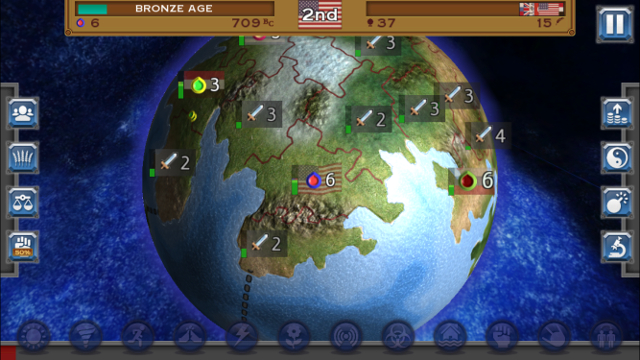
 How to record Gameplay Videos in 1080p 60fps on PlayStation 4 or Xbox One
How to record Gameplay Videos in 1080p 60fps on PlayStation 4 or Xbox One Scivelation Wiki – Everything you need to know about the game .
Scivelation Wiki – Everything you need to know about the game . Sequence 1 - A Spanner in the Works: Assassin's Creed: Syndicate Walkthrough
Sequence 1 - A Spanner in the Works: Assassin's Creed: Syndicate Walkthrough FIFA 16: Create and customize your own players
FIFA 16: Create and customize your own players How To Play Railroad Tycoon And Similar Games On Android
How To Play Railroad Tycoon And Similar Games On Android